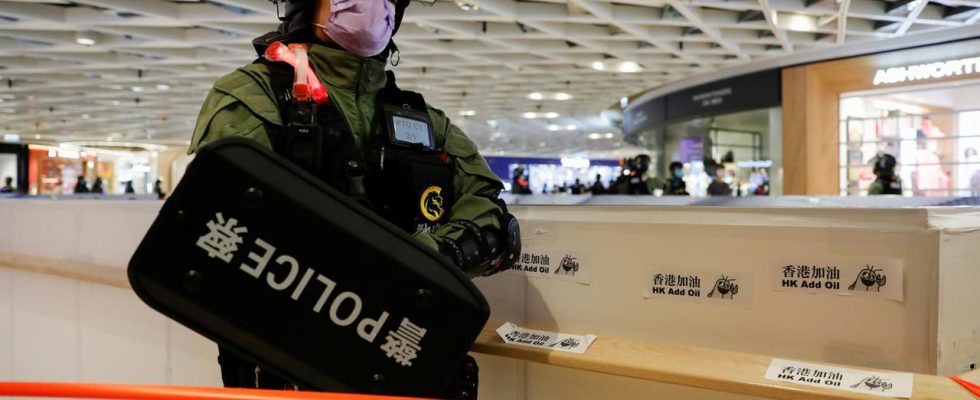China’s “security law” has been in effect in Hong Kong for three years – now it’s being applied again: the authorities issued arrest warrants, including a bounty, against former members of parliament and activists who live in exile.
The bounty: one million Hong Kong dollars per person – the equivalent of almost 117,000 euros. Among the eight wanted persons in exile are former MPs Nathan Law, Dennis Kwok and Ted Hui. A trade unionist, a lawyer and three activists are also present.
They currently live in Canada, Australia, the United States and the United Kingdom. The bounty is not for show, said Steve Li, chief of Hong Kong’s national security police. It’s about enforcing the law.
Democratic MP Ted Hui (M) was escorted out of the Legislative Council Chamber in Hong Kong by security personnel in May 2020. At the time, the plenary debated a law against the abuse of the Chinese national anthem.
260 people arrested
Specifically, it is about the so-called “National Security Law”. Three years ago, it was deployed by the Beijing central government in the originally autonomous Chinese special administrative region of Hong Kong. It can criminalize almost anything that goes against the communist state and party leadership.
Common accusations using the law include: secession, subversion of state order, terrorism and collusion with foreign powers. According to official figures, 260 people have been arrested for violating the “security law” in the past three years, including opposition politicians, activists, lawyers and media representatives.
Wanted politician Ted Hui is dismayed
Former Hong Kong politician Ted Hui, who is now in exile in Australia and now has a bounty on his head, said the ARD: “The bounty increases the Chinese Communist Party’s persecution of the Hong Kong diaspora. It makes it clear to western democracies that China is moving towards extreme authoritarian politics and poses a greater threat to the world.”
“Proof of Deep Hostility”
Sophie Richardson from the human rights organization Human Rights Watch criticized the recent arrest warrants. She called on the international community to impose new sanctions on those responsible in Hong Kong. “They are a testament to the Chinese government’s deep hostility to human rights,” Richardson said.
These cases should be resolutely rejected by all democracies. “Governments should make it clear that they will not comply and they should consider taking steps to protect Hong Kong’s diaspora communities.”
China could rely on Interpol
The announcement of the issued arrest warrants, including a bounty, came a week after the publication of an article in the state-run Chinese newspaper “Ta Kung Pao”. It quoted an excerpt from the “Security Law”. Accordingly, the legislation would also apply to people living outside of Hong Kong.
The article went on to say that China, as a member of the international criminal police organization Interpol, could ask member countries to help arrest those wanted.

